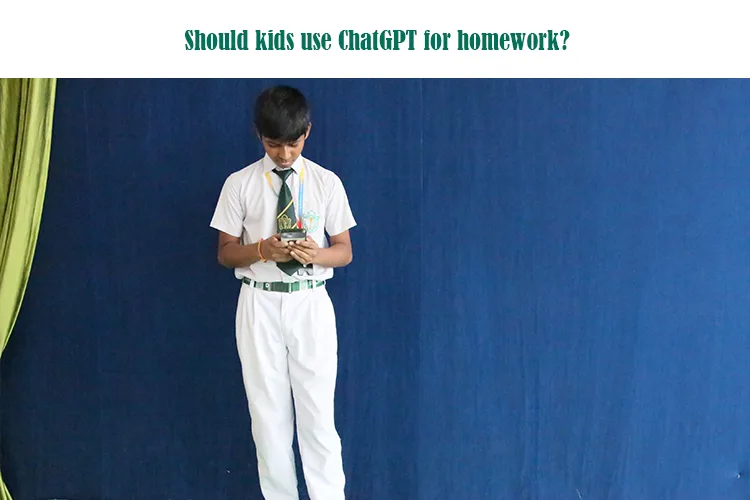In today’s world of education, students utilise AI as homework tools. Though it enhances digital awareness, it calls into question the ways children engage with technology. AI can help with brainstorming new ideas, but it can also encourage the usage of shortcuts and dependence on it.
Regarded as one of the best CBSE schools in Hyderabad, DPS Warangal believes in balancing AI in learning. This ChatGPT homework guide is intended to support parents in navigating ethical AI use. We believe in shaping tech-savvy learners who think critically and use technology ethically.
What is ChatGPT, and how is it used?
ChatGPT is a virtual assistant tool developed by the GPT model. The interactive chatbot allows people to carry out human-like conversations, based on user prompts. Trained to understand prompts and generate answers, AI never fails to amaze its users with its detailed and relevant responses.
Following its sudden popularity, ChatGPT in education has a significant impact on the lives of Gen Z and students. Primarily, students use ChatGPT as an AI homework tool, like solving math problems, writing essays or summarising lessons. Its easy accessibility and quickness make it an instant solution for students. This, ultimately, increases productivity and enhances the use of AI in learning among students.
Potential Benefits
Students find ChatGPT in education interesting for multiple reasons. One of them is its availability. Unlike human tutors, ChatGPT acts as an on-demand tutor. It is available 24/7 to resolve doubts and explain concepts clearly. Students feel free to ask questions any time without any fear of judgment.
ChatGPT also helps with storytelling and simplifying lessons. If used rightly, it can ignite curiosity and creativity among students. With its detailed explanations, ChatGPT also gives related concepts that might be of help. For example, a child learning about climate change may also learn about concepts like global warming, greenhouse effect and deforestation.
ChatGPT in education has become an essential tool for teaching critical thinking in AI. It doesn’t merely provide direct solutions to questions, but also guides students to think beyond their spectrum.
Key Concerns and Ethical Risks
As useful as ChatGPT in education is, it can also lead to its misuse by students. Students excessively use ChatGPT to complete assignments. This isn’t only cheating and plagiarising content, but also a decline in traditional writing skills. Lately, many schools have noticed and taken strict measures to detect AI-generated content.
Many times, ChatGPT provides lengthy but incorrect answers confidently. Students mistake it as a search engine and fail to cross-check the facts before turning in. The misleading information, also called AI hallucinations, hinders critical thinking in AI, writing and research skills.
Apart from academic support, students also utilise ChatGPT as their daily life companions. They use it for decision-making, which creates over-reliance on AI. But living a life as AI tells us to is unethical and dangerous. This ultimately diminishes their confidence and self-reliance, as they struggle to cope with both academics and real life.
Best Practices for Parents
With AI taking the role of a guide, parents play a crucial role in shaping the way their child consumes AI. Below are some best ChatGPT parenting tips to ensure a balanced use of AI, without disrupting their child’s academic routines.
Open Dialogue:
Regularly ask your child what tools interest them–how and why they use AI. These casual discussions will help you understand their learning methods better. Foster honest and non-judgmental conversations around AI.
Define rules:
Parents need to set boundaries to differentiate between AI in learning and dishonesty. AI should be used for research assistance, and not to complete tasks. This, thus, maintains academic integrity.
Promote critical evaluation:
Blinded by confident responses, students fail to verify AI informational accuracy. It is your responsibility to teach them to cross-check from trusted sources. This trains them in digital literacy and AI cheating prevention.
Balance screen and thinking time:
Parents can encourage children to take some time away from screens for self-reflection. These problem-solving support activities will develop attention span and independent creativity.
Model ethical behaviour:
Since children learn from observations, you can share your experiences with AI. This will make them informed and understand technology better.
How does DPS Warangal support ethical AI use?
At DPS Warangal, we integrate AI tools in classrooms through various mediums. Our guided lessons and discussion boards ensure AI cheating prevention. Our well-trained staff promote academic honesty while keeping an eye on AI usage. Tutors are well-versed in the latest AI-detection tools. These tools further maintain integrity between the students and academics.
Our curriculum is designed to include digital citizenship and AI literacy sessions. These workshops equip students with AI homework ethics and use it judiciously. Students are taught to verify and cross-check for AI informational accuracy. Thus, it helps students critically evaluate and understand ethical AI use for students.
If used rightly, AI holds the power to support and transform learning. We at DPS Warangal promote ethical and supervised AI usage for students. We believe in partnering with parents and involving them in the learning process. Together, we can help foster a tech-friendly school with the best merit students. Let us create an environment they need to thrive in the real world.


